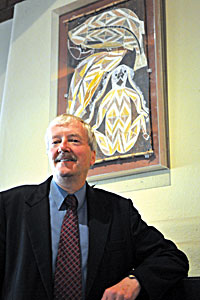 CHONG ZI LIANG |
Nepali Times: Your three year tenure in Nepal has been very eventful. What is your assessment of Nepal's political transformation?
Graeme Lade: It has indeed been an engrossing and interesting time to be in Nepal and witness history in the making, especially with Jana Andolan II and the peaceful end to the monarchy. Australia has welcomed the conclusion of the peace accords and the Constituent Assembly election outcome. Australia's principal interests in Nepal are all linked to contributing to Nepal's economic development. We hope that all parties to the peace process can work together cooperatively and create the conditions for building a strong and economically prosperous Nepal.
Yet, political instability remains elusive. What does this do to the investment climate?
It is one thing to talk about encouraging foreign investment, but much needs to be done to create a conducive investment environment. Political stability is a key factor for this.As the Australian ambassador, I have been pleased to support the Australian Snowy Mountains Engineering Corporation (SMEC), in trying to take forward the West Seti Hydro-power project. This project will show other foreign investors that a large-scale engineering project on this scale is feasible in Nepal. It will also open up the development of Nepal's rich hydropower potential and help Nepal earn revenue and better address its own longer term power needs. I am proud that an Australian company is acting as a catalyst in bringing Nepal together in a cooperative venture with its two big neighbours, India and China.
Yet, the project is still stuck.
It has indeed been a long and tortuous process to get the West Seti project up and running. I am very hopeful that following a meeting with the Asian Development Bank board in March, the way will be opened for commencement of the project later in 2009.
Looking back, what were some of the highlights of your Nepal posting?
There are a number of things that have given me great professional satisfaction. Perhaps the most significant was, in my former capacity as convenor of the Kathmandu-based representatives of the Core Group on Bhutanese refugees, being able to play a role in helping give the Bhutanese refugees hope after 17 years of languishing in refugee camps. Others also played key roles, including Kanak Mani Dixit in helping to demonstrate to key government officials that third country resettlement was the only viable humanitarian solution at the present time.
I have been pleased to maintain Australia's close links with the Tilganga Eye Centre, including officiating at a ceremony making Dr Sanduk Ruit an honorary Member of the Order of Australia. Other satisfying memories include the Embassy's role in launching cervical cancer vaccine in Nepal, support for the Kathmandu Model Hospital in improving microsurgery expertise and support for the efforts of an Australian doctor in opening the way for kidney transplants in Nepal.
And regrets?
My biggest regret is that as my assignment is soon ending I will not be in Nepal to see the commencement of the West Seti project. My successor will have that honour.
Australia has become a major destination for Nepali students. What can be done to regulate this so unscrupulous recruiters don't dupe students?
I welcome the growth of Nepali students' interest in going to Australia, which offers quality education and a quality lifestyle. I want to see this interest continue. However, I have been concerned at the proliferation of new education agents and the increase in misleading information and document fraud. I have commenced working with the Nepal government to see if there are ways the activities of education agents can be better regulated. In the meantime, prospective students should do their own research. The Australian government offers free information services. Students should also be aware that no agent can guarantee visa issue or permanent residence and be wary of promises that seem too good to be true.
Any chance that Nepalis can get their Australian visas in Kathmandu itself and not have to apply in India?
The present immigration arrangement through a service delivery partner is working well, both in Nepal and in India, where VFS collects visa applications for Australia in nine locations, including New Delhi. Currently, there are no plans to re-establish an immigration processing office in Kathmandu. The Australian immigration team in New Delhi visits regularly to monitor the service and is always receptive to feedback about how services might be improved.


